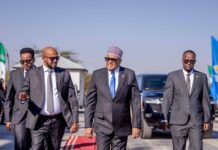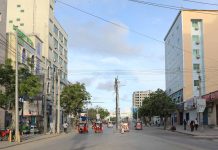MOGADISHU (Somaliguardian) – Al-Qaeda-aligned Al-Shabaab militants on Wednesday rejected the U.S. military’s claim that it killed a weapons dealer for the group in a drone strike near the northeastern Somalia town of Badhan in the Sanaag region on September 13. The militants described the claim as a justification for the killing of Somali civilians.
The U.S. Africa Command (AFRICOM) had earlier taken responsibility for the drone strike targeting Omar Abdullahi Abdi, a well-known and respected clan leader in Jiicaanyo area. The claim of responsibility came amid earlier speculation that the United Arab Emirates was behind the elder’s assassination.
“In coordination with the Federal Government of Somalia, U.S. Africa Command (AFRICOM) conducted airstrikes targeting an al Shabaab weapons dealer on Sept. 13, 2025,” AFRICOM said in a statement.
In response, Al-Shabaab dismissed the U.S. military’s assertion, saying the targeted man was neither a member nor a weapons dealer for the group. The militant organization described the claim as a baseless attempt to legitimize the elder’s assassination.
Al-Shabaab further stated that the incident was not isolated but part of a broader pattern of attacks by the U.S. against Somali intellectuals and civilians since the 1990s. The group asserted that the U.S. not only targets civilians, falsely labeling them as militants, but also sometimes kills Somali government troops and regional forces, branding them Al-Shabaab.
As an example, the militants pointed to a 2016 drone strike that killed 13 Galmudug regional forces near Galkayo. The U.S. initially claimed the victims were all Al-Shabaab members, but it was later revealed they were pro-government forces, highlighting, according to Al-Shabaab, the “lies about its drone operations in Somalia.”
In its statement, the group declared it would not accept its name being used to justify attacks harming Somali civilians or carrying out massacres.
AFRICOM did not name the individual targeted in the airstrike, describing him only as an Al-Shabaab weapons dealer. This vagueness has fueled growing speculation and anger over the elder’s assassination.
Clan leaders from Sanaag region, where the elder hailed from, have demanded an immediate explanation from Puntland authorities on who provided the information that led to the U.S. strike and why. Although AFRICOM said the strike was conducted in coordination with Somalia’s federal government, no official response has come from Mogadishu.
It took five days for the U.S. military to claim responsibility for the strike, which sparked protests and outrage in Sanaag.
Before the U.S. statement, many Somali political analysts and former officials suspected the United Arab Emirates, which has a growing military presence in Puntland state, was behind the assassination. Protesters in Sanaag accused the UAE of orchestrating the killing because the elder opposed a mineral and gold extraction deal between Puntland’s leadership and Abu Dhabi. Videos showed residents blaming the UAE for what they described as illegal exploitation of their region’s resources.
However, the U.S. claim has shifted the narrative, though many questions remain unanswered by Somalia’s federal government and the U.S. military.
The elder was an unarmed man who lived in a peaceful area controlled by Puntland security forces and frequently traveled between major Puntland towns, including Bosaso and Garowe. If he was truly a weapons dealer, critics ask why he was not arrested and interrogated rather than killed and then posthumously labeled a militant.
This is not the first time the U.S. has claimed to have killed Al-Shabaab members who later turned out to be civilians, sparking public anger.
Somali security officials and regional authorities have reportedly used U.S. airstrikes to target political opponents, individuals from rival clans, or people with whom they have disputes. Since the beginning of U.S. drone operations in Somalia, hundreds of civilians, including women and children, have been killed or wounded. Many were initially claimed as militants, but later investigations revealed their innocence.
What remains most painful, according to observers, is that many of those harmed in U.S. strikes were women and children – and few, if any, have received compensation or apologies for wrongful deaths or injuries.
Contact us: info@somaliguardian.com












